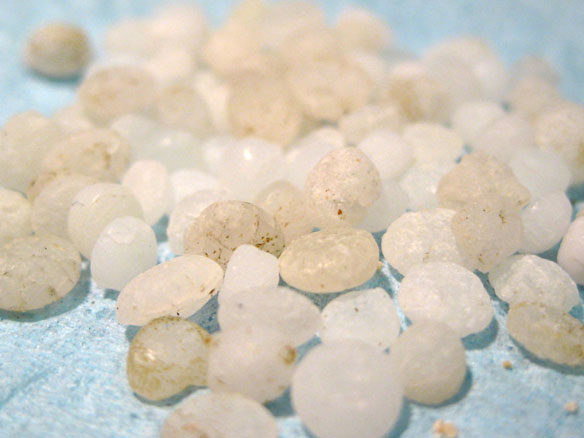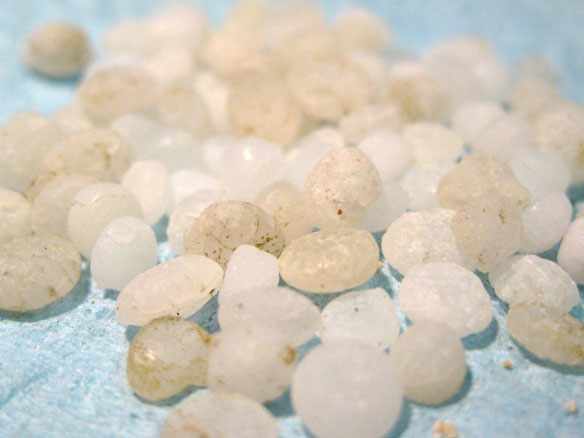
Pre-production plastic pellets are melted down and used in the manufacturing of the plastic products that we use everyday. These pellets enter the environment and are frequently found in areas of marine debris concentration. Captions and Photo source: NOAA
Excerpts;
Millions of plastic pellets are leaking out into the environment from a manufacturing site in Stenungsund, according to a new Swedish study. Despite several international and national sets of regulatory frameworks, the leaking continues…
Read Full Article; Science Daily (02-20-2018)
Tiny plastic pellets found on 73% of UK beaches; Guardian UK (02-16-2017)
A search of hundreds of beaches across the UK has found almost three-quarters of them are littered with tiny plastic pellets. The lentil-size pellets known as “nurdles” are used as a raw material by industry to make new plastic products.
Microbeads Entering Our Water Daily Could Cover 300 Tennis Courts; Huffington Green (07-18-2015)
The Ocean Is Contaminated by Trillions More Pieces of Plastic Than Thought, IOP Science (12-08-2015)
This new study suggests there are 15 to 51 trillion micro plastic particles (those less than 200 millimeters in size) in the world’s oceans, weighing between 93 and 236,000 metric tons. This is about seven times more than scientists had previously estimated…
Video captures moment plastic enters food chain, BBC News (03-11-2017)
A scientist has filmed the moment plastic microfibre is ingested by plankton, illustrating how the material is affecting life beneath the waves. The footage shows one way that plastic waste could be entering the marine and global food chain…
People may be breathing in microplastics, health expert warns; Guardian UK (05-10-2016)
People could be breathing in microparticles of plastic, according to a leading environmental health expert, with as yet unknown consequences on health…
Whale and shark species at increasing risk from microplastic pollution – study; Guardian UK (02-05-2018)
Whales, some sharks and other marine species such as rays are increasingly at risk from microplastics in the oceans, a new study published in the journal Trends in Ecology and Evolution, suggests…
Brain damage in fish from plastic nanoparticles in water, Science Daily (09-25-2017)
A new study shows that plastic particles in water may end up inside fish brains. The plastic can cause brain damage, which is the likely cause of behavioral disorders observed in the fish…
Plastic Pollution: The Great Plastic Tide, Coastal Care ©-2009.
“The unprecedented plastic waste tide plaguing our oceans and shores, can become as limited as our chosen relationship with plastics, which involves a dramatic behavioral change on our part…”









